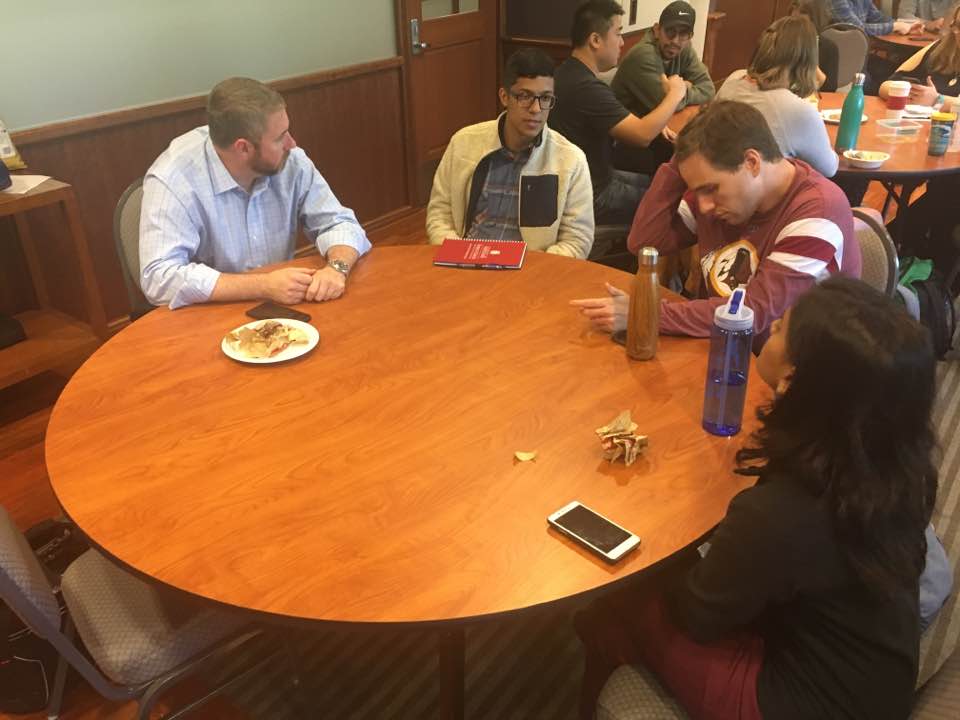
The new standard of corporate sustainability goes way beyond complying with regulators and appeasing nonprofits. Business leaders today are being pushed to embed social and environmental impact into the value chain to drive performance and competitive advantage. The work is complicated and sometimes surprisingly challenging to articulate.
In early October 2017, Sarah Matheson Mihalecz, head of the North American Sustainability Division at the Tata Group, joined students from the MBA program at the University of Maryland's Robert H. Smith School of Business to share tips on how to clearly explain the business case for sustainability. The event was co-hosted by the Center for Social Value Creation and the Smith Net Impact Chapter.
Mihalecz kicked off the conversation by explaining that, “At some level, sustainability is everyone's job.” As she walked students through the history and current approach to sustainability at Tata, it became clear that this was especially true for Mihalecz’s organization. “I came to the event because I wanted to learn more about TATA's involvement with sustainability… and was surprised to see them in so many industries, placing sustainability at the forefront of their businesses,” stated first-year MBA candidate Melissa Borts.
Tata has long envisioned a world where environmental, social and ethical principles are embedded into its core business strategy. Mihalecz revealed that for Tata this matters because the company sees all three principles as essential ingredients to improving quality of life in the communities it serves.
Mihalecz went on to state that over the last five years Tata has started to step up its public commitment to sustainability, bringing the work she does to the core of the company. In 2015 Tata signed onto the “we mean business” coalition as part of a larger pledge to report climate change information into a mainstream report as a fiduciary responsibility and continues to push its efforts with volunteerism.
Once students had a feel for her work, Mihalecz turned to the students to continue the conversation in small groups. In groups, students were invited to come up with a time they had to talk about a challenge related to sustainability and were pushed to identify the strategies used to effectively communicate and problem solve around the issue. After about 10 minutes, groups reported out.
Answers ranged from tackling large-scale problems through government solutions to coming up with a strategy to persuade MBA students to print double-sided, but one theme stood out as a constant in student responses; sustainability goals today often come from business realities driven by the expectations of external and internal stakeholders.
Mihalecz noted that the same holds true at Tata. “Regulations are always the bottom line and then we work our way up. At Tata, it is always our goal to do what is good for business and the environment, even if there are no laws mandating it,” she explained.
After taking a few additional questions from the audience, Mihalecz wrapped up the event by telling her own story about a time she worked with a diverse set of stakeholders to change the supply chain of a major retailer to eliminate over 20 million metric tons of carbon from its supply chain. What could have ended in disaster turned out to be a major success due to the presence of a strong leader and one clear goal that everyone could return to.
Through the story, Mihalecz left students feeling empowered and prepared to have deeper conversations about sustainability with all audiences. Looking back on the event Borts reflected, “sustainability comes in many forms and industries, learning more about where and how sustainability can be incorporated was the true takeaway from the workshop.”
For more information about the Center for Social Value Creation, visit: www.rhsmith.umd.edu/svc.
Media Contact
Greg Muraski
Media Relations Manager
301-405-5283
301-892-0973 Mobile
gmuraski@umd.edu
About the University of Maryland's Robert H. Smith School of Business
The Robert H. Smith School of Business is an internationally recognized leader in management education and research. One of 12 colleges and schools at the University of Maryland, College Park, the Smith School offers undergraduate, full-time and flex MBA, executive MBA, online MBA, business master’s, PhD and executive education programs, as well as outreach services to the corporate community. The school offers its degree, custom and certification programs in learning locations in North America and Asia.